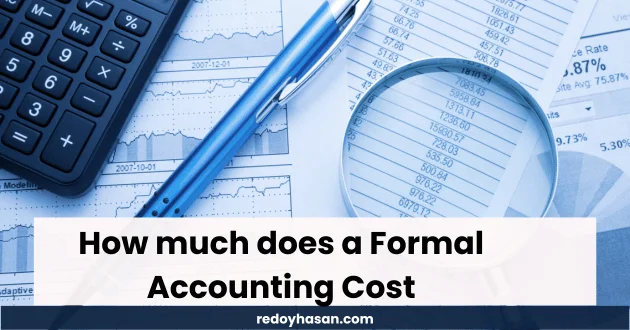
Understanding the financial health of your business is pivotal, and formal accounting is the backbone of achieving this clarity. But one burning question that often pops up for entrepreneurs, startups, and established businesses alike is, “How much does a formal accounting cost?” In this blog post, we will delve into understanding the intricacies of formal accounting costs and help you navigate through the process of making an informed decision for your business. Stay tuned as we shine some light on this essential financial aspect.
What is Formal Accounting?
Formal accounting, by definition, is a comprehensive system employed to catalog a company’s financial transactions accurately. It encompasses recording, classifying, and summarizing business operations, ranging from purchases, sales, and payments to receipts. The primary purpose of formal accounting is to provide a precise depiction of a business’s financial status, which is critical for decision-making and tax filing purposes. Further, it aids in identifying financial strengths and weaknesses, offering valuable insights that can propel business growth.
Formal accounting becomes necessary in various situations, especially when there is a legal obligation for businesses to furnish accurate financial data. For example, publicly traded companies, financial institutions, and large corporations often come under the scanner of regulatory bodies, making formal accounting crucial. Additionally, businesses seeking external funding or planning to get listed on stock exchanges may need formal accounting to present a reliable financial picture to potential investors.
The formal accounting process requires several documents, including sales invoices, purchase invoices, bank statements, and other proof of transactions. All these documents are integral to ensuring the accuracy and integrity of the financial information being recorded. Let’s discuss the factors that impact formal accounting costs.
Cost of Formal Accounting
The cost of formal accounting is not a one-size-fits-all model. Several factors contribute to the final price, making it essential to understand what influences the costs before hiring an accounting firm or professional. Here are the key elements that affect formal accounting costs:
- Business size
- Industry
- Geographical location
- Services required
Business Size
The size of your business is one of the main factors affecting the cost of formal accounting. Generally, larger businesses require more complex accounting processes and procedures, which can drive up costs. Smaller businesses, on the other hand, may have simpler accounting needs, resulting in a lower cost.
Industry
The complexity and nature of your business also play a significant role in determining the cost of formal accounting. Industries that require specialized knowledge or have complex transactions may incur higher costs. For example, businesses in the manufacturing or construction industry may require detailed tracking of expenses and revenue, leading to higher costs.
Geographical Location
The location of your business can impact formal accounting costs significantly. In regions with a higher cost of living, such as major cities, the rates for professional services tend to be higher. Additionally, different countries have varying tax laws and regulations that can influence accounting fees.
Services Required
The types of services required by a business also contribute to the final cost of formal accounting. Some businesses may only need basic bookkeeping services, while others may require more complex tax preparation and financial analysis. The more extensive the scope of services, the higher the cost is likely to be.
Benefits of Formal Accounting
Formal accounting comes with numerous benefits when compared to informal accounting. First, it offers a systematic and organized way to record, classify, and summarize financial transactions, providing a clear and detailed picture of the company’s financial health. This is crucial for decision-making, tax filing, and strategic planning. In contrast, informal accounting may lack the structure and thoroughness needed to offer a complete and accurate financial view of a business.
Formal accounting also provides a high level of transparency and compliance, which is often required by stakeholders, including investors, lenders, and regulatory bodies. On the other hand, informal accounting may not meet the regulatory standards, increasing the risk of non-compliance and potential legal action. Lastly, formal accounting, backed by certified professionals, lends credibility to the financial data, which can enhance trust among stakeholders.
Formal Accounting Submission to Court
Submitting a formal accounting to the court is a meticulous process, requiring adherence to specific, detailed formats. Typically, it involves preparing a comprehensive report with an accurate record of all financial transactions, assets, liabilities, income, and expenses during a designated period. The report should also include explanations for any significant transactions or changes.
Next, the report is submitted to the court, along with any required supporting documents like receipts, invoices, and bank statements. The court then reviews the report for accuracy and compliance with legal requirements. If approved, the court issues a decree settling the account, providing legal protection against further claims regarding the accounted period.
Risks and Challenges of Formal Accounting in Estate Administration
Administering an estate involves a plethora of complex tasks, and introducing formal accounting into the mix can present additional risks and challenges. For starters, the workload can significantly increase. Executors or administrators need to meticulously record, classify, and summarize all financial transactions associated with the estate, which can be a time-consuming process requiring high levels of accuracy.
The costs associated with formal accounting can also be substantial. Hiring attorneys who specialize in estate administration and professional appraisers to accurately value the estate’s assets can quickly ramp up expenditure. In addition, any errors or inaccuracies in the accounting process can lead to complaints from beneficiaries, further adding to the workload and potentially leading to legal disputes.
The executor or administrator could face potential liability risks. If they fail to properly account for all assets, income, and expenses associated with the estate or mismanage assets, they could be held personally responsible, leading to potential legal repercussions.
How to Choose a Formal Accounting Firm
Choosing a formal accounting firm requires careful thought and consideration. There are several key factors to keep in mind. First and foremost, consider the firm’s expertise in specific accounting formats. Each industry has its own unique set of accounting standards and practices, making it crucial for your chosen firm to understand these nuances.
The ability to file formal accountings with the court is another essential factor. Engaging a firm with experience in court filings ensures they understand the strict procedural requirements, deadlines, and formats, reducing the risk of non-compliance and potential legal complications.
Costs are another vital aspect to consider. Formal accounting can be a significant investment, with costs varying based on the complexity of your business and accounting needs. Be sure to clearly understand the firm’s fee structure upfront to avoid unexpected expenses down the line.
Lastly, consider the time requirements. Formal accounting can be a time-consuming process, particularly for businesses with complex financials. Make sure the firm you choose has the capacity to handle your accounting needs promptly and efficiently.
Conclusion
In conclusion, the cost of formal accounting can vary significantly based on several factors, including geographical location and services required. However, the benefits of formal accounting far outweigh the costs, providing a structured, transparent, and credible approach to managing a company’s financials. In estate administration, while there are risks and challenges associated with formal accounting, it is a necessary process to ensure transparency and compliance with legal requirements. When choosing a formal accounting firm, carefully consider their expertise, ability to file court submissions, costs, and time capacity to make an informed decision that meets your business needs. So, it is always better to hire a professional and experienced firm for formal accounting services.


